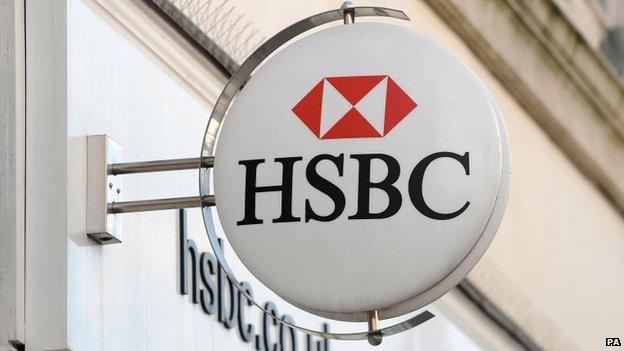HSBC whistleblower: There are 'more revelations'
- Published
- comments
Herve Falciani: "There should be prosecutions"
He came across as credible, assured and clear in what he is trying to achieve.
Nothing less than a "battle against secrecy".
And now Herve Falciani has revealed that far from this week being the end of the story, there is still plenty of information that is likely to come out about HSBC.
One million new bits of data, to be precise.
He says work will start soon on analysing the information.
And that a major oil company could be next to feel the effects of a major data leak about how it operates.
'Relieved'
Mr Falciani is the man behind the largest data leak in banking history - and after days of revelations about HSBC and tax evasion by its wealthy customers between 2005 and 2007, he now says he feels vindicated.
The BBC has seen an email obtained by Le Monde that Mr Falciani sent in 2008 to Her Majesty's Revenue and Customs (HMRC).
It offered details of clients in what was described as a large private bank in Switzerland.
He told me that HMRC did not respond, despite a follow up phone call to the tax evasion hotline.
HMRC told Parliament on Wednesday that it had no record of the email. After last night's revelations, it said it was now looking into whether it had received it.
I asked him how it felt, seeing the email again, seven years after he sent it.
"Relieved in a sense. It's part of public awareness now."

Mr Falciani says that HSBC should still be prosecuted for past failings.
There are now questions about why HMRC didn't respond and why it has taken so long for the information to become public.
HSBC has said it has reformed how its private bank operates and that there are now far fewer clients and much stricter controls.
Anyone involved in the allegations of tax evasion have left the bank, sources tell me.
But Mr Falciani says that HSBC should still be prosecuted for past failings.
"We have to punish, no matter how big they are," he said, saying that there could have been "hundreds" of other banks involved in helping wealthy people avoid and evade tax.
He called on European, Asian and American law enforcement agencies to work together to tackle bank corruption.
Whistleblowers should also be given more protection so they can reveal what they know.
'Huge journey'
Critics of Mr Falciani - and there are many - say he is a whistleblower who comes with a health warning.
They say he stole the HSBC data when he worked at the bank and originally hawked the information around for money.
He denies both allegations.
"It is wrong," he said. "They try to kill your reputation, like the mafia. It is already starting to be proved to be wrong.
"I never asked for payment and I will have time to prove that."
Mr Falciani says that the last seven years have been endured at some considerable personal cost.
He told me he has no real home and travels around Europe supported by a network of people who, he says, are also engaged in the battle against secrecy.
The negative effect on his life has been "tremendous - personal, professional and physical risk, and of course the reputational risk".
Whistleblowers have to be ready for a long fight. "It proves how difficult it is and how tricky you have to be," he said. "It took many more years than I expected.
"It's a huge journey."